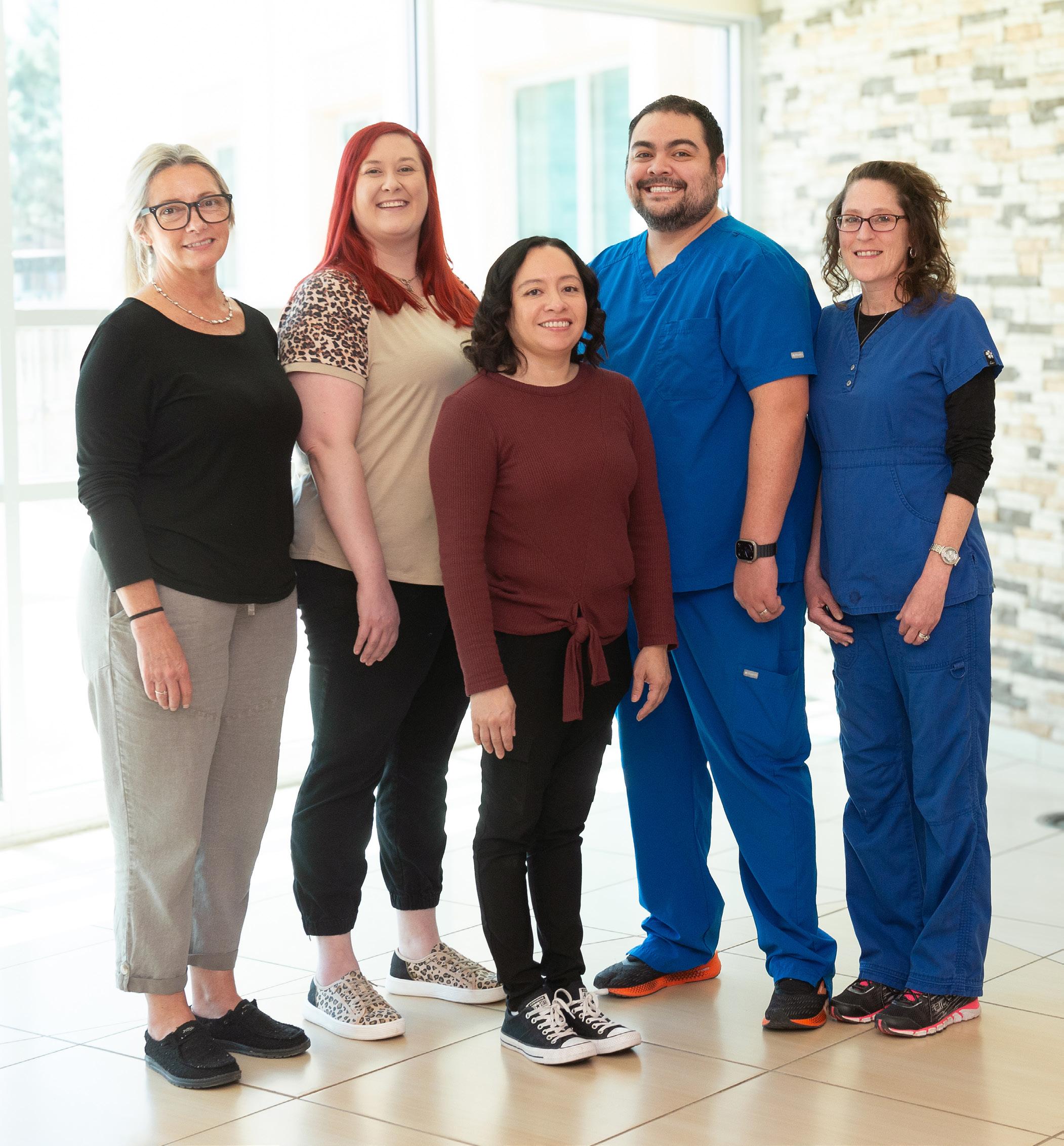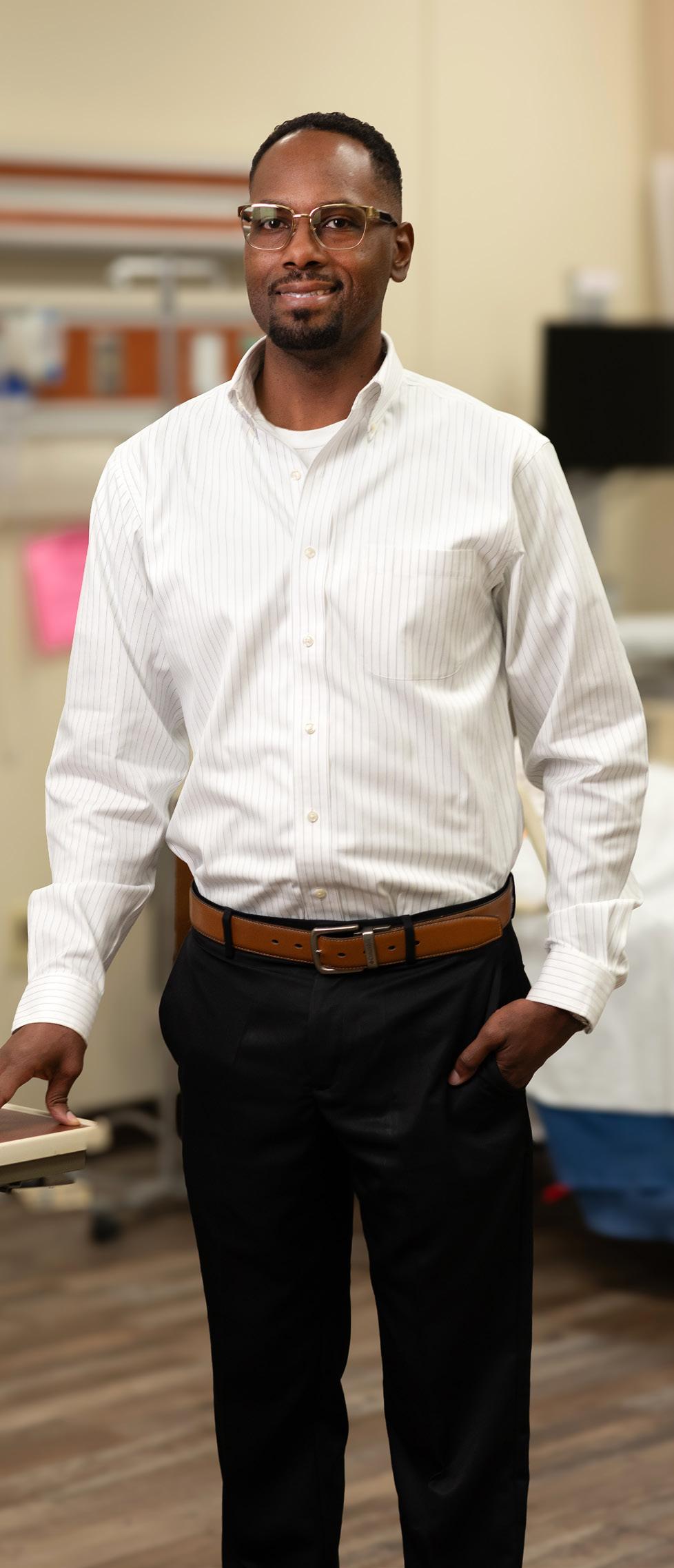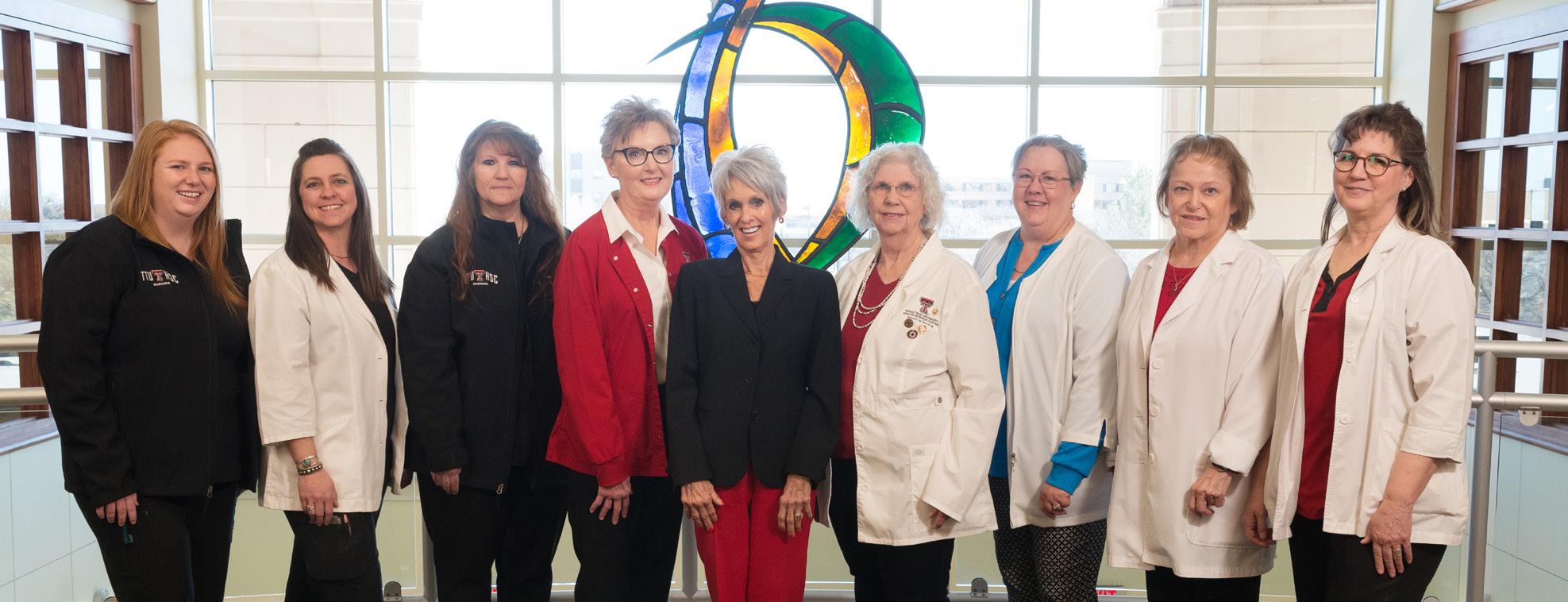NURSES
If you’ve ever spent time in a hospital, you know the value of a caring, attentive nurse. And the pandemic definitely put the dedication of these health professionals on full display. Surveys regularly identify nursing as one of the most trusted professions in the nation, and as a career, nursing offers more opportunities than ever before. May is National Nurses Month, recognizing the valuable contributions of these professionals. In this special section, we highlight some of the nurses and nursing educators changing lives in this area.
[ SPECIAL ADVERTISING SECTION ]

NURSES
Andrea
Line Director Northwest Texas Healthcare System
What is your specialty? Since graduating nursing school, I have worked as an emergency room nurse. One might expect me to answer that the ER is my specialty; however, in my current role as manager, I would like to think my real specialty is my ability to adapt and change!
What inspired you to pursue a career as a nurse? I previously was a lab manager at a specialty chemical company—nursing is a second career for me. When I married my husband, Derrell, 30 years ago, he was a nurse. Listening to him piqued my interest in the field. Few careers afford the opportunity nursing does to make a difference in the life of someone who may be having a terrible day. After staying home for a season with my children, I attended nursing school and reentered the workforce. It has been a great career fit for me and has been a shared interest for us as a couple.
What are the most important qualities of a successful nurse? The qualities of active listening, empathy, patience, speaking in a manner the listener can understand, and an all-encompassing kindness to patients and colleagues are required for success.
The manager in me says one-third of the career is being clinically competent with skills and assessment, one-third is showing up regarding attendance and engagement, and one-third is taking care of the required aspects of the position in relation to education, certifications and charting. Also, a good attitude is a must for the patient and team experience.
What do you like most about being a nurse? I truly love talking to people in all stages of life and varieties of situations and hearing their stories. Even as a manager, the best part of my day is having a chance to make a patient’s day better in some small way. I thrive on change, so the ER is a great environment that offers endless interesting patients and situations, which I enjoy.
What has been the most surprising aspect of your field? I received an excellent education at AC, but nursing school only grazed the surface of education for the field of nursing. I have been surprised at the rapidity of changes in the medical field. It is absolutely necessary to be a lifelong learner in order to provide the most current, evidence-based practices in nursing.
What challenges have you overcome in your career? The balance of work and home life was a challenge when my children were little. It is difficult to be in a career that requires 24/7 coverage. I was the charge nurse at NWTHS in the ER the night we made the transition from paper charting to electronic medical records. This change has been positive in many aspects and allows for tracking and trending of care and concomitant outcomes. It has also created a challenge for nurses to balance the time they want to spend at the bedside with the requirements of charting.
How do you relate to each patient you care for? I may not know every patient on a personal level, but I’ve lived long enough and been exposed to enough situations that I can recognize and relate to fear, anxiety, frustration, loneliness, or a lack of understanding or peace. Regardless of the situation, it is important to relate to and empathize with the emotions caused by illness or injury.
What advice would you give to a new or aspiring nurse? Nursing is a great career. It is portable to every part of the country and can be a part-time or full-time commitment, depending on the needs of each stage of your life or career. I would especially emphasize to new graduates that starting a new job will probably be quite stressful; every job I’ve had, nursing or otherwise, has taken a season to be able to feel competent and comfortable. Also, it is absolutely OK if the first job out of school is not a perfect fit! The possibilities are endless—try different nursing positions until you find what you are passionate about, then become the best at it!
806.354.1000 | NWTHS.COM [ SPECIAL ADVERTISING SECTION ]
Deloach, MSN, CEN, CPHQ Emergency
Service
Department

NURSES

(L-R): GINA GAINES, LVN; MEGAN YOUNG, RN; VERONICA GONZALES, RN; CHRIS DELEON, RN; ROCHELLE DANNHEIM, RN
Oceans Behavioral Hospital Amarillo
What inspired you to pursue a career as a nurse? Lisa Schulz, RN: Growing up, my dad was in and out of the hospital with earlyonset Parkinson’s disease. It was scary and hard being a child and watching your loved one struggle like that. The nurses were always so patient with us and helped us understand what was happening. I knew I wanted to grow up and be able to provide that same level of compassionate care to patients and their families.
What are the most important qualities of a successful nurse? Gina Gaines, LVN: Some of the most important qualities for a successful nurse are listening, compassion and integrity.
What do you like most about being a nurse? Haley Houghton, RN: The thing I like most about nursing is seeing patients get better. We never meet them on their best day, so seeing them improve is rewarding.
What has been the most surprising aspect of your field? Candice Arguelles, RN: The degree to which patients rely on us for quality care and advocacy, and trust us as their care team.
What challenges have you overcome in your career? Megan Cobb, LVN: I have overcome many challenges, from learning new skills to how to cope with this side of nursing, which often involves deescalating a behavior to redirect the patient’s attention to something else, so other behaviors won’t get elevated.
How do you relate to each patient you care for? Megan Young, RN: By listening to each patient, having empathy and compassion, and trying to put myself in their shoes to help understand some of the emotions they may be experiencing.
What advice would you give to a new or aspiring nurse? Stephany Phagan, LVN: Be open to learning new things, wear comfortable shoes, be compassionate, listen with open ears, hold hands when needed, and remember to smile even through the tears. Most importantly, don’t lose who YOU are.
[ SPECIAL ADVERTISING SECTION ]
7501 WALLACE BLVD. | 806.310.2205 OCEANSHEALTHCARE.COM/ OHC-LOCATION/AMARILLO

Walter J. Adams Student Learning and Licensure Specialist Amarillo College
What is your specialty? In the past, I have worked in medicalsurgical nursing and focused on electrophysiology. I have also done some local travel nursing, going to towns within an hour radius of Amarillo to help there; however, I’m currently transitioning and plan soon to specialize in diabetic nursing. Currently, I’m a student learning licensure specialist helping students grasp concepts and prepare for their boards exam.
What inspired you to pursue a career in nursing? Entering a medical field always appealed to me. After earning my GED, I sat down and wrote out the attributes I desired for a career. I wanted a profession that could take me around the world; one that could offer me a lot of variety; and one that would allow me to both serve the public and make a good living. When I compared my list to a long list of health care careers, nursing beat out all the other options!
What are the most important qualities of a successful nurse? You must be calm under pressure, possess people skills and a positive outlook, and be an instinctive decision-maker. If you combine these qualities, you have a project manager, and that’s exactly what a nurse has to be. We juggle so many moving parts, and we do it with the health and well-being of our patients in mind.
What do you like most about working with students in an education setting? I like building confidence in nursing students, helping them with personal development, and helping them find their purpose while they are navigating nursing school.
What has been the most surprising aspect of your field? How impactful, influential and prestigious the nursing profession can be. You can take care of a patient once and they will remember you forever! Patients and their families sometimes cry when they see you in public and express deep gratitude for the help you gave them—for being the arm that lifted them during a time of pain, anxiety and uncertainty.
What challenges have you overcome in your career? Throughout my time as a nurse, I have overcome the chaos of COVID-19, the nursing shortage (which is still in effect), the potential for nursing burnout, and the danger of becoming a jaded health care professional.
How do you relate to the students that you serve? I’m intentional about being approachable, and have learned how to challenge students while making sure I maintain their dignity. Once I’ve earned their respect, I’m able to influence them as someone who has been where they are seeking to go.
What advice would you give to a new or aspiring nurse? Don’t rush the process. Enjoy the journey. If you focus on what you are becoming, you will never lose sight of where you are going. I encourage new nurses to make friends and make time for themselves and their loved ones, so they will have support for coping in a highly stressful environment.
NURSES
ACTX.EDU/NURSING

Texas Tech University Health Sciences Center School of Nursing
What do you consider the most important qualities of a successful nurse? A successful nurse embodies service and dedication, providing compassionate care and positively impacting patients’ lives. Continuous learning, flexibility, critical thinking and professionalism are vital. In order to influence policy, being involved in professional organizations is very important.
What do you like most about being a nurse educator? The opportunity to make a tangible difference in someone’s life. Nurses find fulfillment in witnessing patients’ recovery and offering comfort during difficult times. Interacting with patients and their families, despite challenges, is rewarding. Trust from patients is cherished, and nurturing future nurses is fulfilling. Nurses play a crucial role in interdisciplinary care teams, contributing to patients’ recovery. The nursing profession offers diverse career paths, a chance to work with an interdisciplinary team and growth opportunities.
What challenges have been overcome in the field of nursing and nursing education? Challenges such as technology advancements, evidence-based practices, and nursing shortages persist. The COVID-19 pandemic posed significant emotional challenges, but also highlighted the importance of teamwork in nursing. Nursing is inherently a collaborative endeavor, and teamwork proved indispensable during the pandemic. By banding together and extending assistance to one another, nurses triumphed over the adversities that COVID-19 presented.
As nurse educators, we balance many roles and responsibilities to prepare the next generation of nurses. Amidst changes in the profession, the focus remains on nurturing the next generation of nurses, ensuring they receive the necessary skills and knowledge to excel in their roles
What do you view as the most important aspect of nursing education? You only have one opportunity to be a positive role model; being a mentor and educator must be taken seriously. We want students to take what they are doing seriously and understand the importance of putting patients first and treating others as you would want to be treated.
Every patient a student nurse encounters is someone’s beloved family member—a mother, father, brother, sister, aunt or uncle— and approaching each learning experience with the utmost dedication is important. Fostering learning opportunities through positive experiences ensures students are building confidence and competency in their nursing school journey. As educators, we must ensure a nursing student is prepared for practice upon graduation. What advice would you give to a new or aspiring nurse? Recognize the gift you possess and wield it with care and dedication. Embrace challenges, remain passionate about serving others and never underestimate the impact you can have on the lives of those in your care.
One of the most valuable pieces of advice to new or aspiring nurses is the importance of self-care. You cannot effectively care for others if you neglect your own well-being.
Continue your formal education and become involved in professional organizations. Embrace learning with an open mind, ask for help as soon as you need it, communicate clearly and effectively, develop time management and organization skills, and remember to celebrate your successes.
1400 WALLACE BLVD. | TTUHSC.EDU/NURSING [ SPECIAL ADVERTISING SECTION ] NURSES
SCHOOL OF NURSING FACULTY: AMANDA HEDTKE, MSN; MANDY GUERRERO, MSN; LOUISE RICE, DNP; LIZ MATOS, PH.D.; REGIONAL DEAN VALERIE KIPER, DNP; SHARON BREWER, MSN; SHARON SHELTON, MSN; SHELLY SETH, DNP; DEBORAH CASIDA, MSN

Alee Friemel
King Professor of Nursing West Texas A&M University
Laura and Joe Street School of Nursing
What is your specialty? I have been a nurse for about 10 years, mainly within a women’s medical-surgical unit and nursing academia.
What inspired you to pursue a career as a nurse? Nursing has been an interest of mine since I was a little girl. Every time I stepped foot in a doctor’s office or hospital, I imagined myself on the other side providing care for people in need. I guess you could say I felt called to work in a field where I can use my faith to serve others and make a difference in individuals’ everyday lives.
What are the most important qualities of a successful nurse? Nurses are called to play so many roles. I would say there are three qualities that really matter in being able to juggle all those roles successfully: living with empathy, being able to think critically, and having a sense of humor.
What do you like most about being a nurse educator? Nursing education is the cornerstone to nursing practice. Without strong nurses, health care would suffer. I am proud to educate students to live up to their potential role as a caregiver.
What has been the most surprising aspect of your field? Even though my responsibilities are to teach aspiring nurses, I actually learn something new every day from my students.
What challenges have you overcome in your career? My personal life took off at the same time as my career, so I would say the biggest challenge has been finding the joy of working while raising a young family. Some days are hard, but I have to remember I am here to serve others and that can be both my family and my patients and students.
What advice would you give to a new or aspiring nurse? The work is hard, but the reward makes it worth it.
NURSES
Eunice
WTAMU.EDU






